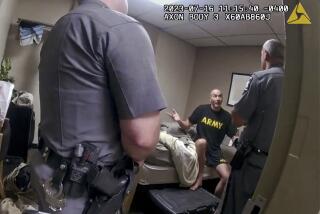Who is Robert Bales? Friends, comrades thought they knew
Reporting from Lake Tapps, Wash., and Norwood, Ohio
For those who grew up with him, Robert Bales seemed to have a place reserved on easy street. Captain of the football team and president of the sophomore class at his Ohio high school, Bales after just three years of college had an oceanfront condo in Florida. He was also pulling in more than $100,000 a year as a financial advisor.
His investment work ran into trouble, though, and when the Sept. 11 attacks came, Bales felt what friends said was an irresistible call. He enlisted in the Army — signed up for the hardest duty anybody could ask for, the infantry — and headed almost straight for Iraq.
“I thought, ‘Jeez, man. That’s crazy. You’ve got it all,’ ” said Steven Berling, a high school friend.
But Bales had long seemed fascinated by what led nations into combat. “I remember one day in AP [advanced placement] history class, Bobby and the teacher were going back and forth about old wars and … various historic battles,” Berling said. “He must have been reading up on all that on his own.”
In Iraq, Bales was a soldier “who really believed in it,” his former platoon leader, Chris Alexander, said. “It was rare to find an E5 soldier who was as deep a thinker as he was.... He’d get into these epic conversations about the Middle East and our role.”
Now, friends are trying to piece together how the gregarious 38-year-old staff sergeant could have become the tragic anti-hero suspected in the late-night massacre of 16 Afghan civilians — a crime that has prompted new questions about how much longer the U.S. can remain in Afghanistan.
For soldiers at Joint Base Lewis-McChord in Washington state, where Bales was based during three deployments to Iraq and one in Afghanistan, the events have been dumbfounding. Bales trained his men carefully, oversaw his patrols vigilantly, and treated Iraqi villagers with respect and good humor. That he could have snapped so precipitously is almost beyond comprehension.
There is sympathy for the financial problems, multiple deployments and violence that may have imposed unbearable stress, but also contempt for a soldier who may have put others in the path of potential violent reprisals.
“The picture that’s being painted of Staff Sgt. Robert Bales — that ‘There but for the grace of God goes any other American soldier’ — this is amazingly offensive,” said Bryan Suits, who hosts a Seattle-based KFI radio show popular with soldiers and veterans.
Suits, who served three Army deployments, said nearly all long-serving U.S. troops had similar stories of nightmarish deployments. “Everybody’s been there. And this is the first time a guy has killed 16 civilians,” he said.
But Bales’ combat colleagues appear more mystified than angry.
“I know Bales. I worked with him for years. He was a great NCO,” Alexander said. “And you don’t go from being somebody like that to all of a sudden shooting unarmed people.... There’s something more to it.”
Longtime friend Michael Blevins, who grew up with Bales in Ohio, said almost the same thing. “I want people to know there is no way the guy I knew did this,” he said. “You don’t go from being a local hero to a monster.”
* * *
People from the working-class neighborhood of shady lanes and two-story panel homes in Norwood, Ohio, where Bales grew up said that, even early on, Bales seemed to feel it was his mission to protect the neighborhood.
“When Bobby was 10 or so, there were half a dozen teenagers talking loud and obnoxious in front of his house. He went outside and ran them off after knocking one of them into the bushes,” Blevins recalled. “My mother watched the whole thing from her porch. When it was all over, Bobby walked across the street and said, ‘I’m sorry they were talking that way and that you had to hear it.’ ”
Bales attended Ohio State University for three years and went to work as a financial advisor with several firms in Ohio, launching his own investment firm with his brother in Florida.
But according to a report from the Financial Industry Regulatory Authority, Bales and his Ohio firm were the target of a major complaint from a client in 2000. In 2003, Bales and his partners were directed in arbitration to pay more than $1.2 million in compensatory and punitive damages for fraud, breach of fiduciary duty and other charges.
Meanwhile, the World Trade Center attacks had occurred, and Bales abandoned the world of stocks and bonds for the Army.
Bales was stationed almost immediately at Joint Base Lewis-McChord, joining the 2nd Infantry Division’s 3rd Stryker Brigade. Court records show he was charged in 2002 with criminal assault in a case involving a girlfriend; the charge was dismissed after he underwent anger management training.
In 2005, he married Karilyn Primeau, who grew up in the well-to-do suburbs east of Lake Washington, and who neighbors said already owned a home in Auburn, not far from the military base. Bales by then was preparing for his second deployment to Iraq and walking with a pronounced limp; acquaintances said it appeared a medical mishap had compounded a previous injury and led to the loss of part of his foot. It’s unclear when the original injury occurred.
“His main focus and goals at that time were to get healthy, get in another unit and go back over there,” said his neighbor in Auburn, Timothy Burgess. “Which kind of amazed me, because he’d already got injured and it was like, ‘Ain’t you done enough?’ ”
Bales also suffered a head injury in a vehicle rollover unrelated to combat. But he seemed to revel in battle and, even when patrols were quiet, would sit alert on the back of his Stryker vehicle as he’d been trained to do, Alexander said.
“Some of us got pretty jaded, but he really wasn’t one of those. There was a genuine, ‘We need to win the hearts and minds’ attitude, and he put effort into it. He’d smile at the kids. He learned a little bit of Arabic to throw out at folks, the kind of stuff that shows you’re not Robocop walking around in body armor.”
The Bales’ two children, ages 3 and 5, were born while Bales was overseas. The couple had moved to a bigger house in the wooded, lakeside neighborhood of Lake Tapps, but they owed too much on the Auburn house to sell it. That house fell into disrepair and the bank took it over.
Soon, the couple had trouble keeping up with the payments on the Lake Tapps house too.
Still, they seemed like a solid couple, said many who knew them. They were hoping, after Bales’ third deployment, that he could be assigned a safe job as a military recruiter.
Ann Burlingame, a high school friend of Karilyn’s, saw the couple at a reunion last summer. “They were handsome; just so happy to be together,” she said. Bales, she said, regaled the group with war stories. “He was really looking forward to spending a career in the military.”
* * *
Things didn’t work out as the couple had hoped, though. Bales was up for a promotion to sergeant first class but didn’t make it. And then the couple got news that Bales’ unit was going to Afghanistan in December.
What went wrong on this deployment is now the subject of an exhaustive Army investigation; official charges are likely later this week.
At a briefing in Afghanistan, a U.S. legal expert said authorities were investigating the possibility that a makeshift bomb had damaged a U.S. tank near the scene of the shootings several days earlier, prompting what villagers said were threats of reprisals from U.S. forces. And Bales’ lawyer, John Henry Browne, said Bales was not present but was traumatized by the explosion that cost a fellow soldier a leg.
After meeting with his client at Ft. Leavenworth on Monday, Browne said Bales remembers little or nothing from when the military believes he went on a shooting rampage.
“He has some memory of some things that happened that night. He has some memories of before the incident and he has some memories of after the incident. In between, very little,” Browne told the Associated Press.
Back home, there were dark rumbles on the domestic front too. On the eve of the shootings, Karilyn Bales had put the house up for sale for more than $50,000 less than they’d paid for it.
On Monday, two small moving vans pulled into the driveway and started the process of removing what had been the Bales family’s life there.
In a statement released through lawyers Monday, Karilyn Bales called the shootings “a terrible and heartbreaking tragedy.” She extended condolences to Afghans who lost family members, saying she and her husband’s family are “profoundly sad.”
“I too want to know what happened,” she said. “I want to know how this could be.”
Murphy reported from Lake Tapps and Sahagun from Norwood.
Times staff writers Molly Hennessy-Fiske in Los Angeles, Richard Serrano in Washington and Laura King in Kabul, Afghanistan, contributed to this report.
More to Read
Sign up for Essential California
The most important California stories and recommendations in your inbox every morning.
You may occasionally receive promotional content from the Los Angeles Times.











